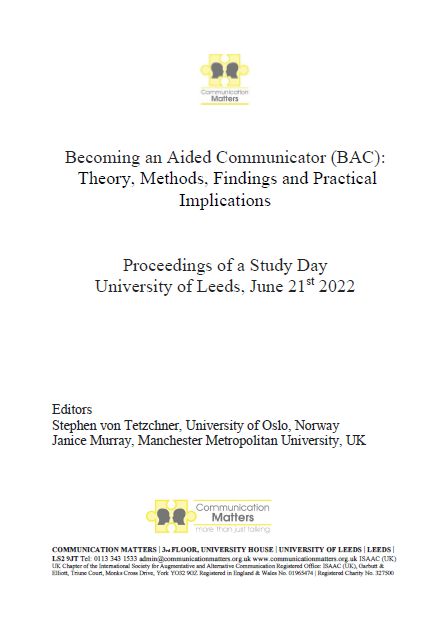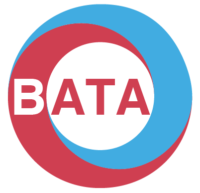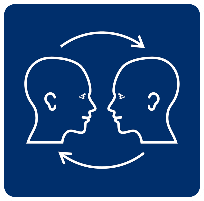2025 Study Day
Post-Conference Research Study Day – 10 September 2025
2022 Study Day
Becoming an Aided Communicator (BAC) Study Day – 21 June 2022
 Communication Matters BAC Study Day Booklet
Communication Matters BAC Study Day Booklet
We are pleased to let you know that the proceedings from the Communication Matters Becoming an Aided Communicator (BAC) Study Day, which took place on 21st June 2022, are now available to purchase in a digital booklet.
The booklet is available to anyone with an interest in language development and AAC. The Study Day focused on the language and communication opportunities of children and young people who are learning language using aided communication.
This large summary document (PDF format) includes abstracts, discussion commentary, bibliography, biographies, and a list of existing publications (total 94 pages). It costs £15.00, with all proceeds going to Communication Matters charity. Our sincere thanks to the BAC team for their contribution.
You can buy the booklet online here and a link will be emailed to you.
Should you require any further information please do not hesitate to contact the CM Office on [email protected].
The focus of this study day is on the language and communication opportunities of children and young people who are learning language using aided communication. It may be of interest to anyone involved in supporting the language development of aided communicators who use low-tech and/or high-tech systems.
Background
The project Becoming an Aided Communicator (BAC): Aided Language Skills in Children aged 5–15 years: A Multi-site and Cross-cultural Investigation includes researchers from 16 countries and several sub-studies. Building on ideas from usage-based theories of language development, the aim of the project was to get insights into the typical course and the variation that exists in aided language development. This required a large group study.
The BAC project, led by Professor Stephen von Tetzchner, investigated aided communication in a select group of 5–15-year-olds with aided language as their main mode of communication, most of them with severe motor impairments due to cerebral palsy. They were not considered intellectually disabled by their teachers and did not have a diagnosis on the autism spectrum. There was also a reference group of children matched for age and gender, without any known learning problems.
The focus was on the language achievements of the aided communicators, on their use of graphic symbols as functional linguistic elements rather than written forms corresponding to the spoken language. Particular interest was given to how they utilized their communication aids and solved communicative challenges in diverse everyday interactions. There are few studies of aided communicators telling about events that are unknown to their communication partner, and judging from the literature, aided communicators seem to have limited experience with this kind of conversation. The insights into aided language development and how aided communicators and their partners interact are needed for an optimal support of aided language development.
The BAC Contribution
The BAC tasks were designed to include different aspects of aided language comprehension and use, many of which are rarely addressed in aided language research. The comprehension part includes recognition of individual graphic symbols and a variety of tasks requiring understanding of sentences of different complexities, and stories. All the comprehension tasks were made with the graphic system each child was using or had used prior to becoming a speller. The children used their own communication aids in the production tasks. These include naming of objects, description of objects without naming, description of static scenes on pictures and dynamic events on video, completion of pragmatic cartoons and instructing partners to construct various toys. The ability to relay new information to other people is the core of human language and in most of the tasks, the child had to relay information and instructions that were novel and unknown to the communication partner. The project also included interviews with parents and teachers about the aid language history of the child and his or her educational history.
For more information about the BAC project, see Special BAC Issue, Augmentative and Alternative Communication, 34, no 1. and Stephen von Tetzchner (2022). Becoming an aided communicator (BAC) – Basic ideas and aims. Communication Matters, in press.
Learning Opportunities for Study Day Attendees
- The study day is open to professionals, AAC users and family members.
- The study day has two parts, a presentation part (10am-1pm) and a discussion part (2-3.30pm). Many of the project members plan to participate in person.
- The first part of the study day will present ideas and results from the project. Each presentation will involve one lead presenter and several co-presenters. The presentations can be attended in person or on Zoom.
- The second part of the study day (2-3.30pm) will have two parallel discussion topics. These break out discussions will be configured to accommodate face to face and virtual attendees to ensure their maximum participation.
- After the parallel sessions, the groups will come together for a 30-minute summary and wrap-up session (3.30-4pm).
Morning Presentations
- Cognition and assessment: This part will present new ideas about assessing aided language competence, including assessment of children who are difficult to assess due to motor impairments.
Lead presenter: Kristine Stadskleiv, University of Oslo - Vocabulary development and construction: This part will consider vocabulary in a broad sense, in particular how young aided communicators utilize the aided lexicon to construct new vocabulary elements.
Lead presenter: Hans van Balkom, Radboud University, Nijmegen - Conversations: This part will present strategies of young aided communicators and their partners, especially when aided communicators need to relay information that has not been previously shared with the partner.
Lead presenter: Martine Smith, Trinity College, Dublin - Communication aids and participation: This part will discuss various ways in which the use of communication aids may both enable or hinder participation in social and societal activities, and the views of young aided communicators on their participation and the role of their communication partners.
Lead presenter: Beata Batorowicz, Queens University, Canada - After BAC: Participating in a study may have considerable impact on the support and social participation of children using AAC. However, in most studies, little is known about their development beyond their performance in the study. This part will present case studies following the participation of the aided communicator and their parents, teachers and peers.
Lead presenter: Catia Walter, State University of Rio de Janeiro
Afternoon Discussions
- Seminar 1 starts from the ideas and findings of the BAC project and discusses the theoretical and methodological bases for the work so far. It will develop into a discussion of how the ideas and methods can be built on and expanded to design new studies, with an emphasis on investigating aided language development and use in everyday communicative interactions.
- Seminar 2 discusses the practical implications of the findings of the current BAC project. Discussion will focus on how these findings, materials and tasks can be used to design new assessment approaches and intervention activities.
Past Study Days
This one-day event split over two half days: 1-3.45pm (GMT) on Tuesday 19th January & Wednesday 3rd February 2021 was a collaboration between Manchester Metropolitan University, Barnsley Assistive Technology Service and Communication Matters.
This event was informed by the findings from a recently funded UK research project (I-ASC: Identifying Appropriate Symbol communication aids for children who are non-speaking). Delegates were offered an in-depth review of the findings of the research and the potential implications of these findings and focussed on the practical suggestions and solutions that may support AAC decision making.
Communication Matters, in collaboration with The Children’s Trust, was delighted to present a new Study Day for all ages which was held in London. The aim of this Study Day was to start a national discussion on how we can better assess and provide Electronic Assistive Technology for people with more significant learning disabilities and promote access to ‘Independent Control’ as an area which requires exploration and, ultimately, national guidance. The day included speakers from the Barnsley Assistive Technology Team, Bath Spa University, The Children’s Trust, Norwood and more.
This is what our delegates said they liked best about the day:
• “Variety of presentations especially the case studies.”
• “Informative and thought provoking.”
• “Networking opportunities / discussions.”
• “Opportunity to meet/hear about other situations.”
Communication Matters, in collaboration with Augmentative Communication in Practice: Scotland held the third in a series of AAC and Literacy Study Days at the Carnegie Conference Centre in Dunfermline. This day approached literacy learning in the context of the Scottish Curriculum for Excellence. Topics ranged from developing early literacy skills for older learners, promoting the use of accessible books for both low and high tech AAC and assessment of literacy for students who have communication difficulties.
Want to stay involved in this topic? Join our AAC Exams Access Working Group.
This is what our delegates said they liked best about the day:
• “The resources and in-depth information.”
• “The range of presentations and groups available, and networking resources.”
• “The presentations were high quality, engaging and varied.”
• “Seeing what is going on in relation to current AAC strategies and practices.”
• “The opportunity to meet up with and share thinking on literacy/learning in AAC.”
• “Lots of bits and pieces to try out, research, download or adapt.”
• “Resources for assessment and development of literacy skills for AAC users.”
Held at the ACE Centre in Oldham, the second in a series of AAC and Literacy based days. This day met the needs of children in both special and mainstream schools and was suitable for both professionals and family members. This study day overlapped with topics discussed at the previous study day. It included special interest talks on issues that relate directly to the challenges faced in delivering literacy to students who use AAC and the challenges students face in acquiring those skills; table top workshops with hands on experience of resources currently available to support the teaching of literacy to AAC users; and an exhibition from suppliers of products directly related to AAC and literacy.
Want to stay involved in this topic? Join our AAC Exams Access Working Group.
Held at The Clare Charity Centre in Saunderton with a keynote from Rebecca Loza (Read Write Inc.) and plenary by Marion Stanton & Adam Lenartowicz. There were also talks from parents (Chantal Bryan & Jules Whicher), teachers (Laura Baggley & Hester Mackay) and 4 suppliers and the day ended with some workshops. The day addressed the needs of children in special and mainstream school & hoped to kickstart a special interest group with subsequent days to be planned. The days are suitable for professionals and family members.
Held at The Lift, London and led by Dr Elaine Clark, Darryl Morgan, Helen Robinson & Dr Greg Pasco (representatives from health, education and research). This study day looked at the use of augmentative communication devices and systems with people with autism.
Held at Birkbeck College, London and led by Jane Farrall and Sally Clendon. This workshop covered the rationale and principles underlying a balanced comprehensive approach to literacy instruction for all students.
Held at Manchester Metropolitan University and led by Janice Murray (MMU) and Martine Smith (Trinity College Dublin). Explored the relationship between symbol communication and the development of literacy.







